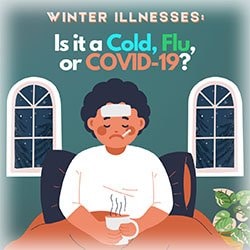Winter Illnesses: Is it a Cold, Flu or COVID-19?
 If you’re coughing and sneezing this winter, how do you know if you have a cold or something more serious? Colds, flus and other respiratory illnesses, including COVID-19 are more common in colder months. People spend more time indoors when the weather starts to get colder, allowing viruses to pass more easily from one person to another.
If you’re coughing and sneezing this winter, how do you know if you have a cold or something more serious? Colds, flus and other respiratory illnesses, including COVID-19 are more common in colder months. People spend more time indoors when the weather starts to get colder, allowing viruses to pass more easily from one person to another.
“The common cold, the flu (also called influenza) and COVID-19 are all contagious respiratory illnesses, meaning they affect your lungs and breathing, and can be easily spread to others,” says PIH Health Family Medicine doctor Michelle Choi DO. “Although their symptoms can look similar, the illnesses are caused by different viruses and have other very important differences.”
The common cold is most often caused by rhinoviruses; the flu is caused by influenza A and B viruses; and COVID-19 is caused by SARS-CoV-2. Cold symptoms can appear 1 to 3 days after exposure to a cold-causing virus. People tend to develop flu symptoms about 1 to 4 days after exposure to an influenza virus. Symptoms of COVID-19 may appear 2 to 14 days after exposure to SARS-CoV-2.
Symptoms
Some symptoms of cold, flu, and COVID-19 are very similar. These include:
• Cough
• Runny or stuffy nose
• Sore throat
COVID-19 and the flu are more similar, and can have common symptoms, including:
• Fever and /or chills
• Headache
• Muscle pain or body aches
• Fatigue
• Shortness of Breath
• Vomiting and/or diarrhea
Both the flu and COVID-19 can also cause no symptoms or cause mild or severe symptoms. Because of the similarities, testing may be done to see if you have COVID-19 or the flu. You also can have both diseases at the same time.
Compared with flu, COVID-19 can cause more severe illness in some people. Compared to people with flu, people infected with COVID-19 may take longer to show symptoms and may be contagious for longer periods of time. Most people who get flu will recover on their own in a few days to two weeks, but some people will experience severe complications.
Both COVID-19 and flu can result in complications, including:
• Pneumonia
• Respiratory failure
• Acute respiratory distress syndrome (fluid in the lungs)
• Sepsis (a life-threatening illness caused by the body’s extreme response to an infection)
• Cardiac injury (for example, heart attacks and stroke)
• Multiple-organ failure (respiratory failure, kidney failure, shock)
• Worsening of chronic medical conditions (involving the lungs, heart, or nervous system or diabetes)
• Inflammation of the heart, brain, or muscle tissues
• Secondary infections (bacterial or fungal infections that can occur in people with flu or COVID-19)
Also, COVID-19 can cause different complications from those of the flu, such as blood clots, post-COVID conditions and multisystem inflammatory syndrome in children.
Treatment
A cold is usually harmless. Most people recover from a common cold in 3 to 10 days, but some colds may last as long as two or three weeks. Although there's no cure for the common cold, treatment may include pain relievers and cold remedies available without a prescription, such as decongestants.
While different treatments may be used for COVID-19 and the flu, both are treated by addressing symptoms, such as reducing fever. For some patients, medications may help lessen the symptoms and shorten the duration of COVID-19 or flu. There is only one antiviral treatment for COVID-19, but there are several antiviral drugs that can be used to treat the flu. Severe cases of either COVID-19 or the flu may require hospitalization.
Prevention
You can get an annual flu vaccine to help reduce your risk of the flu, and potentially reduce the severity of the flu and the risk of serious complications. For COVID-19, you can get a COVID-19 vaccine and additional boosters to reduce the risk of getting COVID-19 and its variants.
“Talk to your doctor if you are experiencing prolonged flu-like symptoms. They may recommend testing to see what might be causing your symptoms,” says Dr. Choi. “It is also important to stay home, rest, and distance yourself from others to avoid spreading the virus.”
If you have symptoms that do not improve or get worse after a week, see your healthcare provider to avoid complications. To find a PIH Health physician near you, visit PIHHealth.org/Doctors.
Copyright 2022 © Baldwin Publishing, Inc. All rights reserved. Health eCooking® is a registered trademark of Baldwin Publishing, Inc. Cook eKitchen™ is a designated trademark of Baldwin Publishing, Inc. Any duplication or distribution of the information contained herein without the express approval of Baldwin Publishing, Inc. is strictly prohibited.